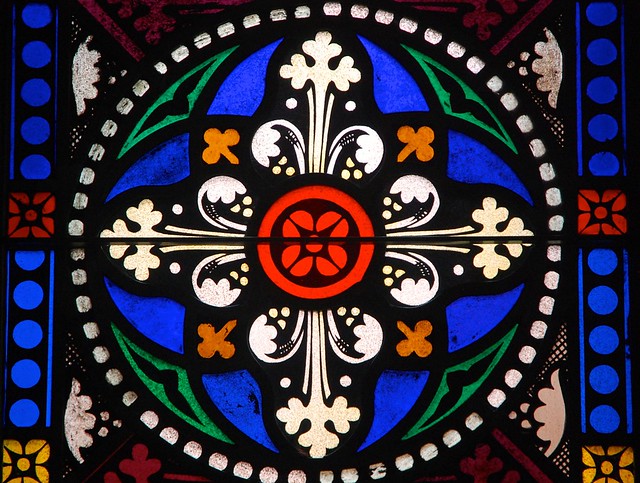
Everyday Liturgies for Our Spiritual Lives
Some of us believe our calendars are like jigsaw puzzles. We color code our time commitments, separating work and family, recreation and spiritual life. The challenge for us is fitting all the pieces together to make the right picture.
Contemplative practices help us see there are no divisions between the ways we spend our time.
It becomes more and more challenging for us to distinguish between work and spiritual life. Our schedules are increasingly difficult to organize as the pieces become more integrated.
Each moment is both spiritual life and everyday life.
Our days are not jigsaw puzzles to be solved but stained glass windows to be appreciated.
If our days and nights are not separated into different colored activities, how can we recognize their significance? How will we appreciate the uniqueness of each day?
The word liturgy refers to the form in which public worship is conducted. It is derived from a technical term in ancient Greek which literally means “work of the people.”
Liturgical worship is not primarily the responsibility of clergy, but is the work of the people.
Everyday liturgies help us grow in our understanding of how everyday life is integrated with spiritual life.
Are there everyday liturgies we can use to celebrate the significance and value of each new day?
What everyday liturgies can we create to help us make the most of our days?
Can we find forms or frameworks to structure our deepening understanding of how we live our lives?
Each of us relies on practices or structures to help us live into our everyday spiritual lives. We balance our lives to include rest and reflection, work and play, solitude and company.
There are lessons for us in the way monastic life schedules its days and nights.
Everyday Liturgies in Monastic Life
It is easy for us to see ourselves as the masters of our own schedules. We can adjust our time commitments on all our devices with the touch of a fingertip.
Whether working or taking a trip, we try to make our time as productive as we can. We try to squeeze more things into our schedules in an effort to squeeze more out of them.
Time is money, and we want ours to be as profitable as possible.
The monks I know have a different system of time management with other priorities. Most of the monks I know do not wear watches or have iPhones with their calendars on them. I cannot think of a single clock at New Camaldoli Hermitage. They are not concerned with wringing every nickel out of every moment of every day.
Monastic time management values balance more than focused productivity. Monks have significant work which needs to be done and time in which to do it. Some of the work monks do is physical or intellectual labor. Monks also spend time celebrating liturgy, the work of the people. They also spend time each day in reflection and rest.
Monks live in community. It is not only important for each monk to manage their own time. The health and strength of the community rely on it as well. The community’s hospitality and worship, as well as its financial viability, depend on its schedule. When the bell rings for the liturgy of the hours, that is the community’s priority.
Monastic time management is about putting values into practice. Each community creates everyday liturgies to reflect its values.
The practices of each community and the monks in it demonstrate their values in practical ways.
Creating Our Own Everyday Liturgies
The ways we have distinguished between different aspects of our lives begin to fade away. Everyday liturgies are how we structure our lives to include practices which reflect our values.
It is important to me, for example, to take a walk each day. Is that a spiritual practice of prayer walking or the physical practice of exercise? Am I clearing my head emotionally or running an errand?
We explore the values which are most significant to us and create ways to put them into practice.
Each of us will have our own personal everyday liturgies. We put our values into practice each day in ways which reflect who we are.
Like monks in a monastery our everyday liturgies help us find balance. Some of our everyday liturgies will be intentional and clearly analyzed. We will recognize other liturgies along the way which we have adopted less consciously.
Nothing helps me recognize my own everyday liturgies better than when someone asks me Why do you do that?
I reflect on the reasons I act the ways I do each day and find deeper understanding of why I do what I do.
Each of us creates our own everyday liturgies whether we are conscious of them or not.
Everyday Liturgies in Community
Spiritual life is at work in us drawing us into community with others. The more I reflect on my own values and practices the more open I will be to deeper community.
Everyday liturgies are neither handed down for centuries nor are they magical mysteries. We create everyday liturgies in new ways each day.
Community grows as each of us reflects on our own values and create our own everyday liturgies.
Walking each day, for example, I come into contact with people who also practice walking. Some of them are more reflective than others.
Whether we recognize how walking puts our values into practice or not we share everyday liturgies.
The strongest community is based in shared values. We do not automatically build communities just because we engage in similar liturgies.
Our everyday liturgies draw us into community with ourselves, each other, and the world around us.
Community grows in new ways when our everyday liturgies reveal themselves to us.
What everyday liturgies will help us put our values into practice today?
When will we take time to reflect on our conscious and unconscious everyday liturgies this week?
How do your own everyday liturgies build community each day?
[Image by Steve Snodgrass]
Greg Richardson is a spiritual life mentor and coach in Southern California. He is a recovering attorney and a lay Oblate with New Camaldoli Hermitage near Big Sur, California. Greg’s website is StrategicMonk.com, and his email address is [email protected].












